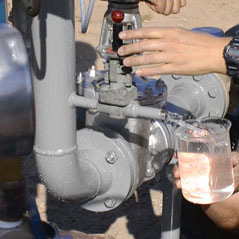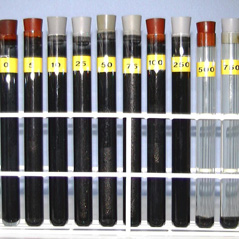Biocide testing
In most cases a contamination of technical systems and underground storages with microorganisms is a risk for safe operation and can quickly lead to technical problems or loss in quality.
The selection of a suitable treatment strategy is often crucial for the further operation of technical systems. The basis for this should be a qualified microbiological expert’s assessment taking important process parameters into consideration.
To estimate the effectiveness of biocides under specific conditions for use (e.g. temperature, salt content, type of infection) MicroPro GmbH uses classic microbiological, biochemical and molecular investigation methods.We offer you:
- Qualified microbiological and molecular biology investigations
- Determining the bacteriostatic/bactericidic effectiveness of chemical formulations
- Determining the effective concentration under specific application conditions
- Investigations on influence through parallel use of other chemicals
- Alternative treatment strategies, recommendations on system operation
Case histories
Investigation of a biocide for use in injection water
Water samples from above-ground facilities for the interim storage of injection water of an oil reservoir were microbiologically examined to check the effectiveness of the biocide used.
Enrichment cultures of bacteria of relevant physiological groups were treated with different biocide concentrations under conditions close to practice and the bacteriostasis and bactericidy of the formulation were determined. It was found, that the already used biocide concentrations only slowed down bacterial growth too insufficiently and that clearly higher biocide doses or an alternative biocide was required.
Apart from this, the commercial rapid-tests used at field station to determine sulphate reducing bacteria (SRB) were compared to the laboratory analyses. Here, it had to be determined that the rapid tests, after proof of lower, but critical germ content, failed, and only worked from relatively high bacteria populations onwards. Alternative test methods were suggested.Biocide treatment of caverns
The operation of numerous caverns has been guided with microbiological investigations by MicroPro GmbH for more than 40 years. Several of these caverns indicated an initial microorganism population after solution mining.
In the early 1970s, the microorganism population of one cavern was exterminated successfully with a self-developed biocide formula. Repeated analyses of the subsequent years proved effectiveness of this treatment. At the end of the 1990s an increase in population with sulphate reducing bacteria (SRB) was found again.
Based on a recommendation of MicroPro GmbH, treatment of the 40.000 m³ cavern was carried out with a salt water soluble biocide in 1999. The investigations in the subsequent years, the most recent one in 2010, indicated that the brine has remained free of germs after this treatment and thus confirm the treatment concept in its immediate effect as well as being a form of long term protection.Biocide treatment of an underground gas storage unit
A population of sulphate reducing bacteria (SRB) was proven in the above-ground facilities of a gas storage unit. There was an increased risk of corrosion here through sour-gas formation. The systems were subjected to an annual, prophylactic treatment with biocides for this reason. After consulting the customer, 5 biocides available on the market at the time were selected to examine their effectiveness compared to the SRB populating the storage unit.
Bacteriostatic and bactericidic concentrations of each of the selected biocides were determined with enriched bacterial culture from the system and a corresponding recommendation for carrying out the disinfection was provided.


